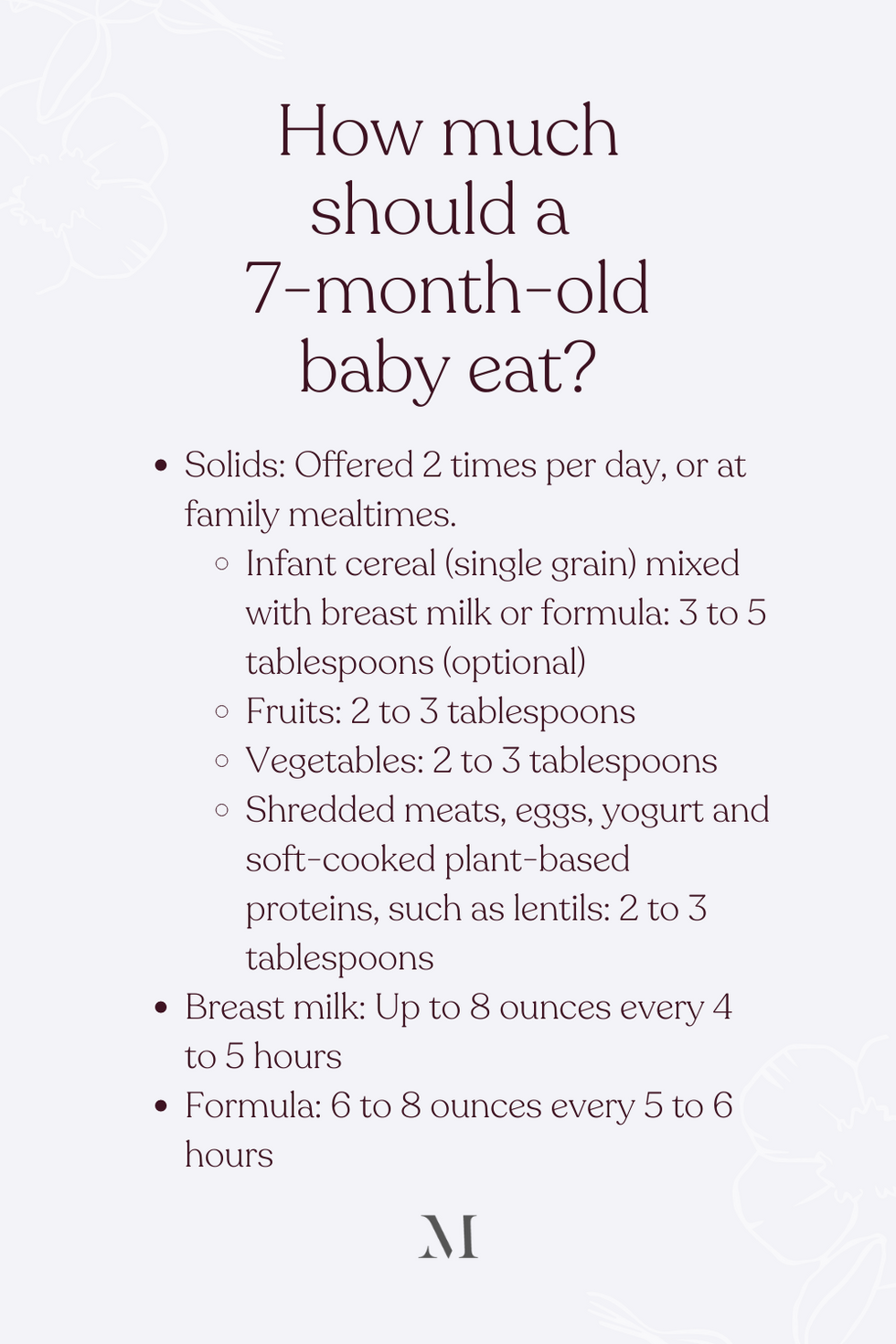7 Month Old Baby Feeding Schedule
You've heard that "food before one is just for fun"—but it can feel like a lot of work, too! With solids now on the menu in addition to breast milk and/or formula for your 7-month-old baby, you're juggling multiple feeding methods. Focus on the fun part as much as you can, mama. It also helps that your baby can now stretch out breast milk or formula feedings much longer than in previous months.
How much should a 7-month-old eat?
The American Academy of Pediatrics and La Leche League recommend the following feeding schedules and amounts for 7-month-olds.
Solids: Offered two times per day or at family mealtimes
Breast milk: Up to eight ounces every four to five hours
Formula: Six to eight ounces every five to six hours
Once your baby hits the 6-month mark and is able to hold their head up unsupported, sit in a high chair, and has doubled their birth weight, it's OK to start solid foods. For now, a little bit goes a long way! While offering solids, the recommended serving sizes for a 7-month-old are:
- Infant cereal (single grain) mixed with breast milk or formula: three to five tablespoons (optional)
- Fruits: two to three tablespoons
- Vegetables: two to three tablespoons
- Shredded meats, eggs, yogurt and soft-cooked plant-based proteins, such as lentils: two to three tablespoons
What's a good 7-month-old feeding schedule?

Remember, it's more important that you follow your baby's cues than adhere to a set schedule, so schedules outlined are general guides of how frequently you'll feed your baby—not hard-and-fast rules.
These guidelines also apply primarily to infants born full-term and without any underlying medical conditions. For preterm infants, babies with certain medical conditions or for any specific questions pertaining to your child, be sure to consult your child's pediatrician for a more customized feeding schedule.
How to pick the best solid foods for your 7-month-old baby
Your baby's menu is going to look different than yours—and that's perfectly fine! Because breast milk and/or formula should serve as the primary source of nutrition for your baby's first year, it's not necessary to focus on creating balanced meals with specific macronutrient ratios (protein, fat, carbs). It's all about experimentation and exposure to new foods and flavors for this stage.
However, prioritizing foods high in iron and zinc can be helpful, as your baby's stores of these nutrients may be starting to deplete around this time if they're exclusively breastfed. Some good options include iron-fortified infant cereal, eggs, tofu, beans and meat. Puree small ingredients to prevent choking.
Can you introduce allergenic foods to a 7-month-old baby?
There's no need to shy away from allergenic foods. Studies show that early exposure to the top eight allergens (eggs, dairy, wheat, soy, peanuts, tree nuts, fish and shellfish), may help reduce the onset or severity of allergies in the future.
Can 7-month-olds have water?
You can offer your baby a small amount of water with meals, not exceeding eight ounces (one cup) per day. Use this opportunity to introduce orthodontic approved sippy cups as an alternative for bottles.
In the past, meal times with your baby felt separate from meal times with your family. But now they are starting to combine! It's pretty amazing to look around the dinner table and see everyone together—even if there is a bigger mess to clean up afterwards now.
Read more about wellness for mama and your 7-month-old:
- Pediatricians warn against fruit juice: Here's what to try instead
- Motherly's Postpartum Wellness Class is here!
- Subscribe to the Becoming Mama podcast
- I'm not 'losing myself' in motherhood—I'm becoming who I'm meant to be
Source: https://www.mother.ly/parenting/7-month-old-baby-feeding-schedule-and-amounts/
0 Response to "7 Month Old Baby Feeding Schedule"
Post a Comment